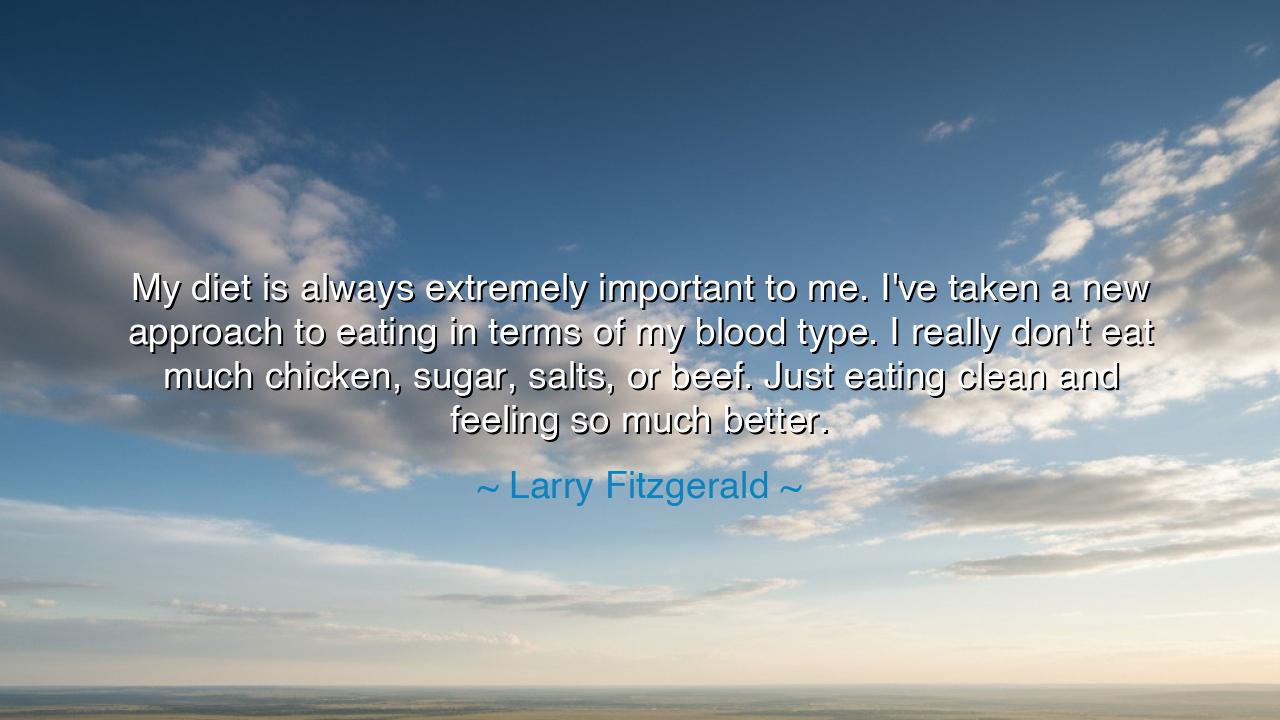
My diet is always extremely important to me. I've taken a new
My diet is always extremely important to me. I've taken a new approach to eating in terms of my blood type. I really don't eat much chicken, sugar, salts, or beef. Just eating clean and feeling so much better.






In the eternal quest for health and vitality, the ancients understood that the foundation of a life well-lived lay in the food we consume. Larry Fitzgerald, with his deep commitment to diet, offers us a glimpse into a truth that transcends time: "My diet is always extremely important to me. I've taken a new approach to eating in terms of my blood type. I really don't eat much chicken, sugar, salts, or beef. Just eating clean and feeling so much better." In these words, Fitzgerald speaks to a profound wisdom—that what we place into our bodies shapes not only our physical well-being but our very connection to the world around us. The diet is not simply about food, but about harmony with one’s own nature, a principle that the ancients knew well.
The great philosopher Hippocrates, often called the father of medicine, understood that true health is built upon a foundation of balanced nourishment. "Let food be thy medicine and medicine be thy food," he proclaimed, knowing that the body thrives when it receives the right elements in the right proportions. Just as Fitzgerald’s approach to food considers the unique needs of his body, ancient healers also understood that each person’s body was unique. Fitzgerald’s decision to eat according to his blood type is a modern echo of this ancient understanding—the recognition that what nourishes one person may not necessarily nourish another. To eat in harmony with the body’s nature is to honor its deeper needs and rhythms.
In the wisdom of Plato, we find a similar reflection. He taught that the pursuit of virtue was an ongoing process of cultivating balance in all areas of life. This balance, he believed, extended to the physical body—where moderation in food and drink was essential to wisdom and a clear mind. Fitzgerald echoes this, choosing to avoid excess in sugar, salt, and beef, embracing the clean, pure sustenance that nourishes the body and mind. In rejecting the temptations of excess, he follows the ancient path of balance, choosing foods that align with his true nature, allowing him to walk through the world with clarity and vitality, much as Plato encouraged his followers to live.
Consider, too, the story of Alexander the Great, whose military prowess was matched by his deep understanding of the balance between body and spirit. Alexander was known for his strict regimen of both exercise and diet, understanding that in order to lead his armies across the known world, he must first master himself. His diet was simple but nutritious, rooted in the foods that supported his physical strength and mental clarity. Just as Alexander chose to nourish his body for greatness, so too does Fitzgerald recognize that a clean diet—one rooted in the foods that serve him best—empowers him to excel in his own endeavors. Both men understood that true strength comes not from indulgence, but from the discipline of making choices that honor the body’s needs.
The teachings of Confucius also align with this understanding. Confucius emphasized the importance of moderation in all things, stating that the wise person does not succumb to excess or deprivation. In his view, true wisdom lies in knowing the right balance of action, thought, and even consumption. Fitzgerald’s careful approach to his diet, focused on clean eating and avoidance of unhealthy foods, reflects the Confucian path of wisdom. By aligning his diet with his body’s needs, he not only enhances his physical health but also strengthens his ability to remain disciplined in other aspects of life. In eating clean, he practices the moderation that leads to clarity and purpose.
In ancient Indian tradition, particularly in Ayurveda, the belief that food is medicine runs deep. Ayurveda teaches that each individual has a unique constitution, and that what nourishes one person may not nourish another. Fitzgerald’s approach to eating according to his blood type mirrors this ancient understanding. In Ayurveda, there is a deep recognition of the interconnection between what we eat and how it affects our body, mind, and spirit. To eat clean, to choose foods that are aligned with our nature, is to honor the wisdom of the body’s rhythms. Like the ancient sages, Fitzgerald recognizes that by eating in harmony with his nature, he can live with greater energy, clarity, and peace.
And so, we are reminded by Fitzgerald’s words that true health is not a random occurrence but a deliberate choice. The key to vitality, to strength, to well-being, is not found in the latest fad or quick fix, but in a deep, thoughtful alignment with the body’s needs. As Hippocrates, Plato, Confucius, and the ancient healers knew, our diet must be a reflection of who we are, of the balance between mind, body, and spirit. The body, when treated with respect, when nourished with the foods that serve its true needs, can become a vessel of great power. Fitzgerald shows us that when we align our diet with our true nature, we unlock the door to a life of vitality, clarity, and purpose.
Let us take this lesson into our own lives. Reflect on the foods that nourish you, the ones that bring you energy, clarity, and strength. Choose to eat with purpose, to make deliberate choices that honor your body’s unique needs. As the ancients have taught, true health is not about restriction or indulgence, but about finding the balance that allows us to thrive. Just as Fitzgerald embraced the clean foods that serve him, so too can we find our path to vitality in the foods that nourish and empower us, body, mind, and spirit.






AAdministratorAdministrator
Welcome, honored guests. Please leave a comment, we will respond soon